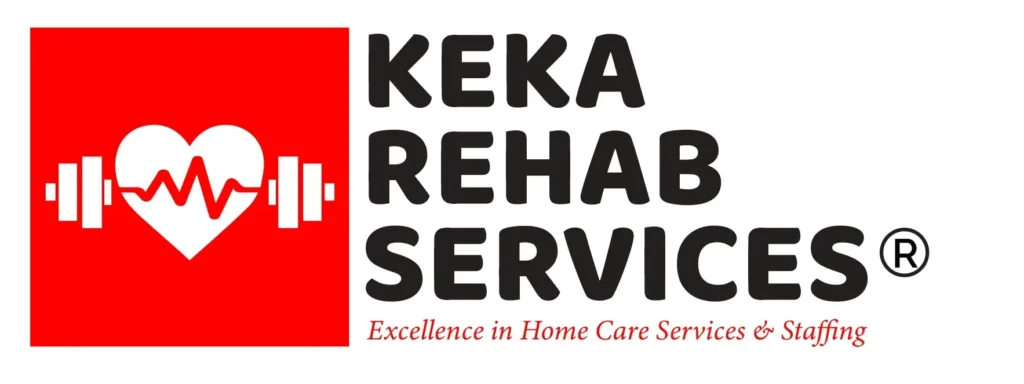Keka rehab services is a top provider of in-home care for seniors. They offer many services, from care for chronic diseases to help with daily tasks. These services aim to improve seniors’ lives and give families peace of mind.
Keka rehab services is known for their Alzheimer’s and dementia care. They were the first to create a special training for caregivers. They worked with Teepa Snow to make the Senior Gems™ program. This ensures seniors with these conditions get the best care.
Senior care providers offer a wide range of services. They help with meal prep, housekeeping, and even care for veterans. They also provide transitional care and respite care to help during changes and give family caregivers a break.
When looking for geriatric services, think about what your loved one needs. From help with personal hygiene to getting to appointments, senior care covers it all. Knowing these options helps you choose the best care for your family.
Key Takeaways
- Comprehensive senior care services are widely available across multiple states
- In-home care providers offer a range of specialized services, including Alzheimer’s and dementia care
- Transitional and respite care options are available to support both seniors and family caregivers
- Services cover various aspects of daily life, from meal preparation to personal hygiene assistance
- Choosing the right care option involves considering all aspects of a senior’s needs
Understanding the Challenges of Senior Caregiving
Caring for older adults is a big job with its own set of challenges. The number of seniors is growing, leading to more money spent on their care. This shows how vital it is to grasp the complexities of giving quality care at home or in retirement settings.
Balancing Family and Caregiving Responsibilities
Many caregivers struggle to balance caring for aging parents with their own family duties. A huge 61% of them care for aging parents or in-laws while also looking after children or grandchildren. This balancing act often means they neglect their own needs, with 82% prioritizing their loved ones’ care over their own.
Emotional and Financial Strains
The emotional burden of caregiving is huge. A massive 96% of caregivers feel emotionally drained. Financial stress adds to this, with 75% of them cutting back on work hours or quitting their jobs to care for someone full-time. The rising costs of assisted living and other care options make things even tougher.
Recognizing the Need for Support
It’s key to know when you need more help. Despite the hurdles, only 27% of caregivers get professional support. Getting help through home care or looking into assisted living can be a big relief. Support groups and counseling are also great for dealing with the emotional side of caregiving.
Understanding these challenges is the first step to finding solutions in senior care. By recognizing the complexities, families can prepare better for the journey ahead and find the right support when needed.
Comprehensive Senior Care: A Holistic Approach
Comprehensive senior care is more than just physical needs. It’s a whole-person approach. This care looks at physical, mental, emotional, social, and spiritual aspects of an older adult’s life.
Geriatric services now include many new therapies. Massage, acupuncture, pet therapy, and music therapy are some examples. These therapies help seniors relax, relieve pain, and feel emotionally better.
Aging support programs focus on social connections and mental stimulation. Book clubs, board games, and arts and crafts help seniors stay connected. Activities like puzzles, reading, and painting also keep their minds sharp.
Physical fitness is key in senior care. Programs like Tai Chi, yoga, and walking keep seniors flexible and balanced. Personalized diet plans also help their physical health.
Technology is changing senior care. Telehealth and communication apps make it easier for older adults to stay in touch. They can talk to loved ones and get medical advice from home.
By focusing on all aspects of health, holistic senior care improves life quality. It helps seniors stay positive and healthy, keeping their independence and dignity.
Family Caregiver Services: Tailored Support for Caregivers
Family caregivers are key in caring for seniors at home. In 2017, their work was valued at about $470 billion. There are many services to help them, making care better for everyone.
Respite Care Options
Respite care gives caregivers a break. In 2014, over 604,000 caregivers got relief from nearly 6 million hours of respite care. It lets them rest, handle personal things, or just take a moment to themselves.
Caregiver Training Programs
Training programs improve caregivers’ skills. They are crucial, as caregivers do over 46% of medical tasks. In 2014, over 100,000 caregivers got help through counseling and training.
Counseling and Support Groups
Emotional support is vital for caregivers. Counseling and support groups are places to share and cope. The National Family Caregiver Support Program connects caregivers to these services. In 2014, it helped over 1.3 million caregivers find support.
These efforts are very helpful. About 74% of caregivers said they could care for longer because of this support. If you’re a caregiver, contact your local Area Agency on Aging for help and resources in your area.
Home-Based Care Solutions for Seniors
Aging support now focuses on keeping seniors at home. This lets them stay in places they know well. It’s about comfort and keeping their independence while getting the help they need.
Home health services are paid by the hour. They offer medical care and personal help. This can include nursing, physical therapy, and help with daily tasks. For those needing less help, adult day programs provide social time and a break for caregivers.
Getting around is key for older adults. Many places offer transportation for seniors. This helps them get to appointments and social events. Making homes safer, like adding ramps and grab bars, also helps seniors move around easily.
Meal delivery is important for seniors’ health. Some services charge, while others are free. It helps seniors eat well without worrying about cooking.
Emergency alert systems give seniors peace of mind. They usually have a setup fee and monthly costs. Even though Medicare doesn’t cover them, Medicaid and other programs might help.
When picking home care, think about location, how easy it is to get to, and upkeep needs. Planning your finances is also key, as care costs go up with more services. Ask family, friends, and doctors for recommendations to find the right services.
Nutrition and Meal Services for Older Adults
Good nutrition is key for seniors. Many struggle to cook healthy meals. So, there are programs to help with food and nutrition.
Congregate Meal Programs
Seniors can enjoy meals together in these programs. They get nutritious food and make friends. It’s great for their health and happiness.
Home-Delivered Meals
For those who can’t go out, meal delivery is a big help. The Home-Delivered Nutrition Program helps a lot of seniors. It’s part of the Older Americans Act.
Meals on Wheels and others deliver up to 900,000 meals a day. Most seniors say these meals help them stay independent.
Nutrition Education and Counseling
Many programs teach seniors about healthy eating. They learn what foods are best for them. Experts say seniors need more protein, about 0.36 to 0.54 grams per pound per day.
Some services even offer meals for special health needs like kidney disease. While Medicare doesn’t cover these meals, some private plans might. Prices vary, but there are discounts for seniors.
These nutrition services are vital for seniors. They help ensure seniors get the nutrients they need for good health.
Health Promotion and Disease Prevention Programs
Comprehensive senior care includes vital health promotion and disease prevention programs. These initiatives aim to enhance the well-being of older adults through evidence-based approaches. The U.S. government established Title III-D of the Older Americans Act in 1987 to support healthy lifestyles among seniors aged 60 and above.
Geriatric services now focus on implementing science-backed programs to improve seniors’ health. Since 2012, there’s been an emphasis on evidence-based requirements for Title III-D funds. This shift ensures that aging support services are both effective and backed by research.
The U.S. Preventive Services Task Force offers recommendations on preventive services in clinical settings, furthering federal initiatives in health promotion. These efforts have sparked private sector involvement in service delivery and medical care financing for seniors.
- Exercise classes
- Chronic disease self-management workshops
- Fall prevention initiatives
- Mental health services
Health literacy plays a crucial role in these programs. By improving health literacy, seniors can better understand and act on health information. This empowers them to make informed decisions about their well-being.
Effective health promotion strategies involve adopting healthy lifestyles and enhancing health literacy among the elderly. These programs often include activities that promote social interaction, mental health, physical activity, and healthy eating habits. By focusing on these areas, comprehensive senior care can significantly improve quality of life for older adults.
Assisted Living and Long-Term Care Options
As you get older, you might need more help. Assisted living and retirement care are good for seniors needing support. They offer everything from a little help to full-time medical care.
Evaluating Assisted Living Facilities
Assisted living places give long-term housing and basic care for older adults who need some help. These places have 25 to 100 residents. They offer a mix of independence and support.
- Available services and amenities
- Staff qualifications and resident-to-staff ratio
- Safety features and emergency protocols
- Social activities and community engagement
Understanding Long-Term Care Insurance
Long-term care can be very expensive. Many use personal funds, government programs, and private insurance to pay. Long-term care insurance can help cover costs for board and care homes and nursing home care.
Nursing homes provide 24/7 medical care for those with serious health problems. They cost more than assisted living but are for those needing a lot of medical help from licensed professionals.
The Role of Long-Term Care Ombudsmen
Long-term care ombudsmen fight for residents’ rights in care facilities. They make sure care is good and solve problems. If you’re looking for care, the Eldercare Locator (800-677-1116) can help find services near you.
Specialized Care for Alzheimer’s and Dementia Patients
Dementia care needs a special touch in senior care. As the disease gets worse, patients need more help. In the middle stages of Alzheimer’s, they need constant watch for safety. Later, they need even more care all day and night.
Geriatric services for dementia include special places. Nursing homes offer ongoing care and medical treatment. They are licensed by states and follow federal rules. Some places must share their costs and what services they offer for Alzheimer’s care.

Life plan communities offer different care levels. They let people move to new levels as their needs change. When picking a place, think about how much it costs, if it takes Medicare or Medicaid, and if it’s available.
For those caring for dementia at home, help is out there. The Veterans Health Library has info on dementia stages and treatments. There are also tips for making homes safer for Alzheimer’s or dementia patients.
But caregivers shouldn’t forget about their own health. Many get sicker from caring for others, and not all get help from others. Services like respite care and adult day health care can give them a break.
Legal and Financial Assistance for Seniors
For seniors, dealing with legal and financial issues can be tough. It’s important to know about resources for elderly help and senior care. In Colorado, about 850,000 people aged 65 and older might need this kind of support.
Medicare and Medicaid Counseling
Medicare helps those 65 and older, and some younger people with disabilities. State Health Insurance Assistance Programs offer counseling to help you understand your choices. Medicaid is a big help for those with low income. In Colorado, single people can earn up to $10,092 a year to get Medicaid, and two-person households up to $15,132.
Elder Law Services
Elder law attorneys are key in planning for retirement. They help with estate planning, power of attorney, and making long-term care decisions. They also explain state laws and tax breaks for assisted living costs.
Financial Planning for Long-Term Care
It’s crucial to plan for long-term care. There are over 400 financial help programs for senior care, like assisted living and in-home care. Veterans benefits, long-term care insurance, and non-profit groups offer more support. These can cover medical bills, facility costs, home health care, and prescriptions. Social Security benefits can also help with elder care costs.
FAQ
What services are included in comprehensive senior care?
Comprehensive senior care offers many services. These include support for family caregivers, care at home, and nutrition programs. It also includes health promotion and specialized care for conditions like Alzheimer’s and dementia. The goal is to improve the quality of life for seniors and help family caregivers.
What challenges do family caregivers face when caring for an elderly loved one?
Family caregivers face big challenges. They must balance family and caregiving duties, deal with emotional and financial stress, and need more support. This can affect their health, finances, and relationships.
What is a holistic approach to senior care?
A holistic approach to senior care looks at all parts of a senior’s life. This includes physical health, mental well-being, social activities, and financial stability. Services like health programs, nutrition support, and legal help are included. This approach aims to keep seniors independent, dignified, and happy while providing needed support.
How can family caregiver services help support those caring for elderly relatives?
Family Caregiver Services offer specific help for those caring for elderly relatives. They provide respite care, training, and counseling. The goal is to help caregivers take care of themselves while caring for their loved ones.
What home-based care solutions are available for seniors?
Home-based care solutions help seniors stay safe and comfortable at home. Services include home health care, personal care, and home safety modifications. Programs like the Dignity At Home Fall Prevention Program help reduce fall risks.
What nutrition services are available for older adults?
Nutrition services for seniors include meals at community sites and home-delivered meals. They also offer nutrition education and counseling. Programs like Silver Cuisine by bistroMD provide healthy meal options, including discounts for AARP members.
What health promotion and disease prevention programs are available for seniors?
Health programs for seniors focus on keeping them physically and mentally well. These include exercise classes, workshops on chronic diseases, and mental health services. The CalFresh Healthy Living program promotes healthy eating and exercise for older adults.
What should I consider when exploring assisted living and long-term care options?
When looking at assisted living and long-term care, consider the facilities and insurance options. Long-term care ombudsmen advocate for residents’ rights. The Office of the Long-Term Care Patient Representative ensures quality care and addresses concerns.
What specialized care is available for Alzheimer’s and dementia patients?
Specialized care for Alzheimer’s and dementia includes tailored support and memory care facilities. Programs like CAlz Connect offer free support and resources for those with dementia and their caregivers.
What legal and financial assistance services are available for seniors?
Legal and financial help for seniors includes Medicare and Medicaid counseling, elder law services, and financial planning. The State Health Insurance Assistance Programs (SHIP) offer insurance counseling. Elder law services help with estate planning and legal matters. Financial planning prepares for long-term care and retirement costs.








